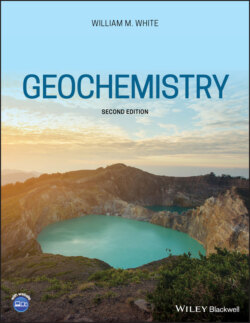Читать книгу Geochemistry - William M. White - Страница 46
2.6.2.3 Summary
ОглавлениеIt is often said that entropy is a measure of the randomness of a system. From the discussion above, we can understand why. Entropy is a function of the number of states accessible to a system. Because there are more states available to a system when energy or molecules are “evenly” or “randomly” distributed than when we impose a specific constraint on a system (such as the thermal insulation between the blocks or the partition between the gases), there is indeed an association between randomness and entropy. When we remove the insulation between the copper blocks, we allow energy to be randomly distributed between them. In the example of the combustion of gasoline, before combustion all oxygen atoms are constrained to be associated with oxygen molecules. After combustion, oxygen is randomly distributed between water and CO2 molecules.
More precisely, we may say that an increase in entropy of a system corresponds to a decrease in knowledge of it. In the example of our two gases in the box, before the partition is removed, we know all red molecules are located somewhere in the left half of the box and all black ones somewhere in the right half. After the partition is removed, we know only that the molecules are located somewhere within the combined volume. Thus our knowledge of the location of the molecules decreases in proportion to the change in volume. Molecules in ice are located at specific points in the crystal lattice. When ice melts, or evaporates, molecules are no longer constrained to specific locations: there is an increase in entropy of H2O and a corresponding decrease in our knowledge of molecular positions. When we allowed the two copper blocks to come to thermal equilibrium, entropy increased. There were more possible ways to distribute energy after the blocks equilibrated than before. As a result, we knew less about how energy is distributed after removing the insulation.
As a final point, we emphasize that the second law does not mean we cannot decrease the entropy of a “system.” Otherwise, the organization of molecules we call life would not be possible. However, if the entropy of a system is to decrease, the entropy of its surroundings must increase. Thus, we can use air conditioning to cool a room, but the result is that the surroundings (the “outside”) are warmed by more than the air in the room is cooled. Organisms can grow, but in doing so they inevitably, through consumption and respiration, increase the entropy of their environment. Thus we should not be surprised to find that the entropy of the manure is greater than that of hay plus oxygen.
